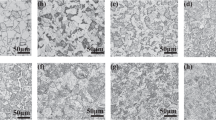Abstract
THE corrosion of a metal in acid solution involves essentially the transfer to another species of one or more electrons by the metal atom, followed by solvation in the aqueous solution. In order to obtain a better understanding of the electron transfer process in this reaction, the rates of corrosion of aluminium, cadmium, cobalt, iron, lead, manganese, nickel, tin, titanium, and zinc were studied in boiling 2 M hydrochloric acid, with and without contact with platinum, iridium, rhodium and palladium.
This is a preview of subscription content, access via your institution
Access options
Subscribe to this journal
Receive 51 print issues and online access
$199.00 per year
only $3.90 per issue
Buy this article
- Purchase on Springer Link
- Instant access to full article PDF
Prices may be subject to local taxes which are calculated during checkout
Similar content being viewed by others
Author information
Authors and Affiliations
Rights and permissions
About this article
Cite this article
BUCK, W., LEIDHEISER, H. Corrosion of Ten Metals in Boiling Hydrochloric Acid when in Contact with Rhodium, Palladium, Iridium and Platinum. Nature 181, 1681–1682 (1958). https://doi.org/10.1038/1811681a0
Issue Date:
DOI: https://doi.org/10.1038/1811681a0
This article is cited by
Comments
By submitting a comment you agree to abide by our Terms and Community Guidelines. If you find something abusive or that does not comply with our terms or guidelines please flag it as inappropriate.



